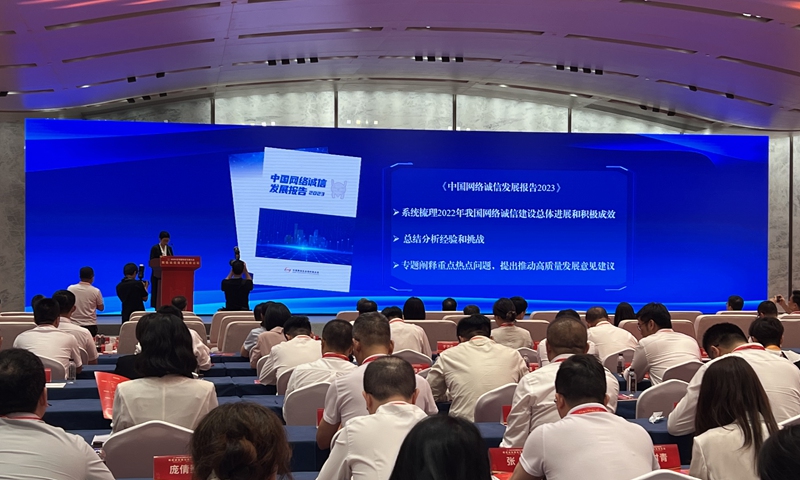Chinese netizens' satisfaction with cyberspace integrity continues to increase, reaching 84%: report

A report on China's network integrity in 2022 is on released on July 17, 2023, at a forum prior to the opening of the 2023 China Internet Civilization Conference in Xiamen, East China's Fujian Province. Photo: Fan Anqi/GT
The satisfaction rate among netizens for China's network integrity in 2022 has continued to increase and reached 84.24 percent, according to a report released on Monday at a forum prior to the opening of the 2023 China Internet Civilization Conference in Xiamen, East China's Fujian Province.
The report drew the participation of nearly 360,000 netizens, with a survey sample covering 96 percent of prefecture-level cities in all provinces and regions across the country. The level of netizen participation and survey coverage has reached a historic high, the Global Times learned from the event.
In 2022, China improved the regulatory framework for internet integrity by formulating and amending two laws, three comprehensive plans, 10 judicial interpretations and 15 administrative regulations, including anti-telecom network fraud law, regulations on strengthening the protection of minors in live streaming, and measures for data outbound security assessment, the Global Times has learned.
Based on a strengthened legal foundation, a series of special campaigns were launched over the past few years, with focuses on enhancing the governance of algorithm abuse, online fraud, chaotic live streaming, "fan circle" disorder and online rumors, among other illegal and harmful online activities.
A special campaign named "Operation Qinglang" was launched over the past few years with a series of activities taken under its auspices.
In 2022, 13 special actions were taken to promote a clean and clear online environment, including combating online violence, rumors and false information, cracking down on internet trolls, regulating the online environment for minors, and tackling issues in live streaming and short videos.
A total of over 54.3 million illegal and harmful pieces of information were cleared during the operation last year, more than 6.8 million accounts were dealt with, over 2,890 apps and mini-programs were taken down, 260,000 groups and forums were disbanded, and more than 7,300 websites were shut down, according to data released at the forum.
In April, 2022, a special operation to crack down on online fraud against seniors was carried out, focusing on various kinds of traps luring them into "consumption" and "investment" through the internet and mobile apps.
By the end of 2022, more than 39,000 cases had been solved related to fraud against seniors and more than 4,730 criminal groups had been dismantled, with over 30 billion yuan recovered.
Most recently, China's top public security and cybersecurity authorities launched a campaign to combat online rumors, starting on Saturday through July 21. It has already punished 373 accounts for spreading false information targeting China's stock market and social security policies.
Despite the remarkable results, the task of building a clean and healthy online ecosystem remains arduous and complex, the report said.
For one thing, problems such as "fan circle" chaos, online water armies (paid-for posts and fake accounts), and telecommunications fraud are long lasting and will not disappear overnight. Some of these issues, driven by low legal penalties and economic interests, tend to adapt and reemerge in new forms even under strict crackdown measures.
What's more, with the development of new technologies and business models, especially with the rapid growth of online live streaming and video users, there have been more violations and breaches of trust, such as excessive tipping, illegal profit-making and malicious marketing.
With the increasing popularity of big data, the Internet of Things, generative artificial intelligence, issues of false information and online rumors have emerged in stealthier ways, such as criminals who exploit deep-fake technology for new forms of fraud, the report noted.



